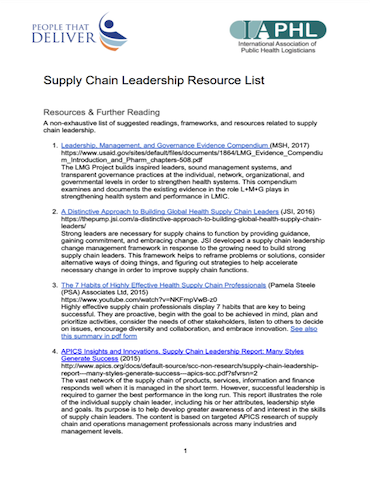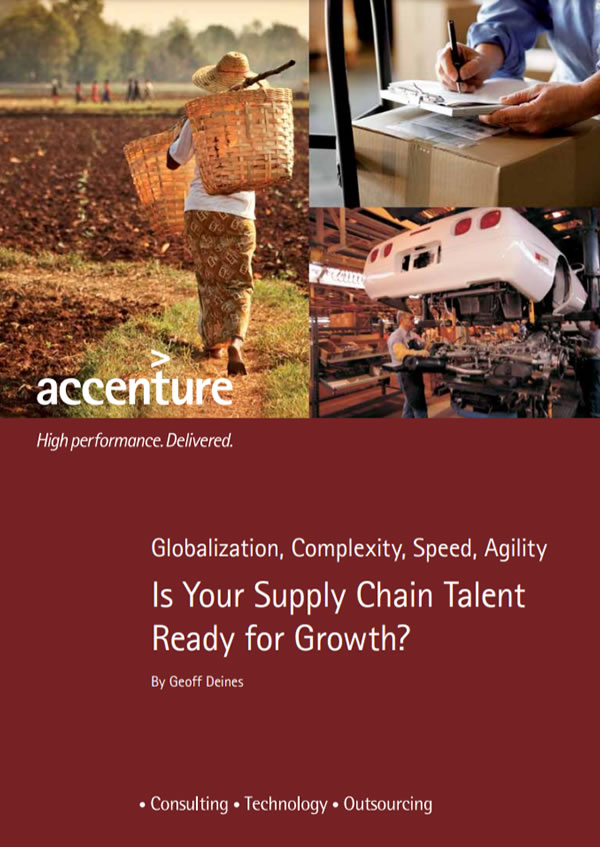Supply chain leadership
As a follow up to the IAPHL and PtD moderated discussion on Supply Chain Leadership, we hosted a joint workshop IAPHL and PtD join forces to better understand Supply Chain Leadership at the 2018 Health and Humanitarian Logistics Conference. As part of this workshop we asked supply chain leaders to recommend articles, tools and guides on the topic, which we have compiled into a non-exhaustive list of suggested readings, frameworks and resources related to supply chain leadership.
Leadership, Management, and Governance Evidence Compendium (MSH, 2017)
The LMG Project builds inspired leaders, sound management systems, and transparent governance practices at the individual, network, organizational, and governmental levels in order to strengthen health systems. This compendium examines and documents the existing evidence in the role L+M+G plays in strengthening health system and performance in LMIC.
A Distinctive Approach to Building Global Health Supply Chain Leaders (JSI, 2016)
Strong leaders are necessary for supply chains to function by providing guidance, gaining commitment, and embracing change. JSI developed a supply chain leadership change management framework in response to the growing need to build strong supply chain leaders. This framework helps to reframe problems or solutions, consider alternative ways of doing things, and figuring out strategies to help accelerate necessary change in order to improve supply chain functions.
The 7 Habits of Highly Effective Health Supply Chain Professionals (Pamela Steele (PSA) Associates Ltd, 2015)
Highly effective supply chain professionals display 7 habits that are key to being successful. They are proactive, begin with the goal to be achieved in mind, plan and prioritize activities, consider the needs of other stakeholders, listen to others to decide on issues, encourage diversity and collaboration, and embrace innovation. See also this summary in pdf form
APICS Insights and Innovations, Supply Chain Leadership Report: Many Styles Generate Success (2015)
The vast network of the supply chain of products, services, information and finance responds well when it is managed in the short term. However, successful leadership is required to garner the best performance in the long run. This report illustrates the role of the individual supply chain leader, including his or her attributes, leadership style and goals. Its purpose is to help develop greater awareness of and interest in the skills of supply chain leaders. The content is based on targeted APICS research of supply chain and operations management professionals across many industries and management levels.
People that Deliver Health Supply Chain Competency Framework for Managers & Leaders (People that Deliver, 2015)
The framework defines the skills, competencies and associated behaviours that are required for effective supply chain management. It can be used to map existing competencies with desired competencies at all levels of the system and inform a capacity development plan to address the gaps.
Supply chain leadership: Distinctive approaches to innovation, collaboration, and talent alignment (Deloitte, 2014)
To help illuminate the strategies and processes employed by Supply Chain Leaders (SC Leaders), and how they differ from Supply Chain Followers (SC Followers), Deloitte Consulting LLP conducted its 2014 Global Supply Chain Survey. It captures the input of more than 400 executives in manufacturing and retail companies around the world, and reveals the distinctive supply chain approaches associated with high supply chain performance.
A Stewardship Approach to Shaping the Future of Public Health Supply Chain Systems (2014)
The global health community has until recently focused much of its attention on achieving relatively near-term goals, such as the 2015 Millennium Development Goals and the Family Planning 2020 goals. However, there is now growing interest in achieving longer-term end games that look a generation into the future, such as attaining universal health coverage, achieving an AIDS-free generation, and ending preventable child and maternal deaths. For those concerned with ensuring access to health commodities, these longer-term visions require a hard look at the supply chain systems of today: How well have they adapted to today's realities? And what must begin now in order to equip them to take advantage of future opportunities and to meet future challenges?
Kotter's Management is (Still) Not Leadership (2013)
Some people still argue that we must replace management with leadership. This is obviously not so: they serve different, yet essential, functions. We need superb management. And we need more superb leadership. We need to be able to make our complex organizations reliable and efficient. We need them to jump into the future — the right future — at an accelerated pace, no matter the size of the changes required to make that happen.
Is your Supply Chain Talent Ready for Growth? (2011)
In today's highly uneven and complex global economy, with growth slowing and recession fears increasing, companies are looking at new opportunities to manage costs and drive growth. Further complicating business models is the fact that growth is occurring almost entirely in emerging markets, and a two-speed economy has developed that is likely to endure for some time to come. In this new era of globalization, emerging markets require more resources (investments, materials, commodities and talent) than mature markets, which are being asked to do more with less and still deliver expected profitability. This disparity contributes to a hypercompetitive, complex environment of rapidly evolving customer expectations and eroding margins. Most supply chain workforces are unable to execute at the pace required to excel in this environment.
Leadership through the Gender Lens: Women and Men in Organisations (2010)
Leadership through the Gender Lens brings together critical analyses and debates on gender, leadership and management with contributions from 13 countries and five continents. How leadership and management are gendered can mean more gender equal or more gender unequal conditions for women and men.
Managers who Lead Toolkit (MSH, 2005)
This toolkit provides managers and facilitators with exercises and tools to improve managers' skills in leading and managing teams and strengthening individual and team performance to produce results.
Managers Who Lead: A Handbook for Improving Health Services (MSH, 2005)
Managers Who Lead empowers health managers at all levels of an organization to lead teams to face challenges and achieve results. It answers questions such as: How can I lead and manage more effectively? How do I create a shared vision and a clear path for achieving it?
Who is preparing the next generation of immunization supply chain professionals?
Organizations in high income countries (particularly the private sector), have acknowledged the importance of supply chain and need for professional supply chain personnel for many years, while government run supply chains in many low-income countries still do not recognize this need.
Recommendations from female leaders in supply chain management
Women and leadership
- Health and Humanitarian Logistics and Supply Chains: A Career for Women by Pamela Awuor Steele
- Why Women Mean Business by Wittenberg-cox and Maitland
- Lean In by Sheryl Sandberg
- Ted Talks by strong women leaders
- 42 Resources for Women in Leadership and Business from MBA@UNC, UNC Kenan-Flagler's Online MBA Program
- Purdue University's Resource Center for Women in Business offers educational, career support and community resources to help women to gain more insight into business and entrepreneurship. The resource also offers financial aid and scholarship information, entrepreneurial funding opportunities, and networking opportunities with professional associations and organizations for women interested in furthering their career as a business professional or entrepreneur.
- Networks such as Women in Logistics and Transport are important as well as communities of practice such as GATNET; a community of practice and public policy program on gender and transport
Leadership in logistics and SCM
- Moving Mountains: Lessons in Leadership and Logistics from the Gulf War by William G. Pagonis and Jeffrey L. Cruikshank
- Strategic Supply Chain Management: The Five Core Disciplines for Top Performance, by Shoshana Cohen and Joseph Roussel
Management and soft skills-building
- Book series by Robert Heller (Managing Teams, Negotiating Skills, Strategic Thinking, Motivating People, Appraising Staff, Balancing Work & Life, Coaching Successfully, Managing Change). These books do not make you a subject matter expert but guide you and build soft skills.
- Thinking, Fast and Slow by Daniel Kahneman
- Eat That Frog!, Twenty-One Great Ways to Stop Procrastinating and Get More Done in Less Time by Brian Tracy
- Time to Think: Listening to Ignite the Human Mind by Nancy Kline
- John Kotter the 8 Step Process for Leading Change
- The Theory of Change by Kurt Lewin (link to overview)
- MIT Sloan Management Review
- Harvard Business Review
- Stanford Social Innovation Review
Technical resources
- JSI's The Supply Chain Manager's Handbook
- Follow supply chain companies, associations, government agencies, donor and partner agencies on Twitter to keep abreast on SC trends, innovations, and articles. This helps access current information and in turn, remain aware of new ideas and materials in the subject matter.
Self help, other
- Girl Wash Your Face by Rachel Hollis
- Psychovampires: A Positive Approach to Energy Suckers by Connie Voigt and Hamid Peseschkian
- Sam Walton: Made In America by Sam Walton and John Huey
- We Should All Be Feminists by Chimamanda Ngozi Adichie
- God is My CEO: Following God's Principles in a Bottom-Line World by Larry Julian
- Emotional Intelligence (EQ) Training
- The best resources are your colleagues, friends and leaders, remember you do not have to do it on your own, reach out!


